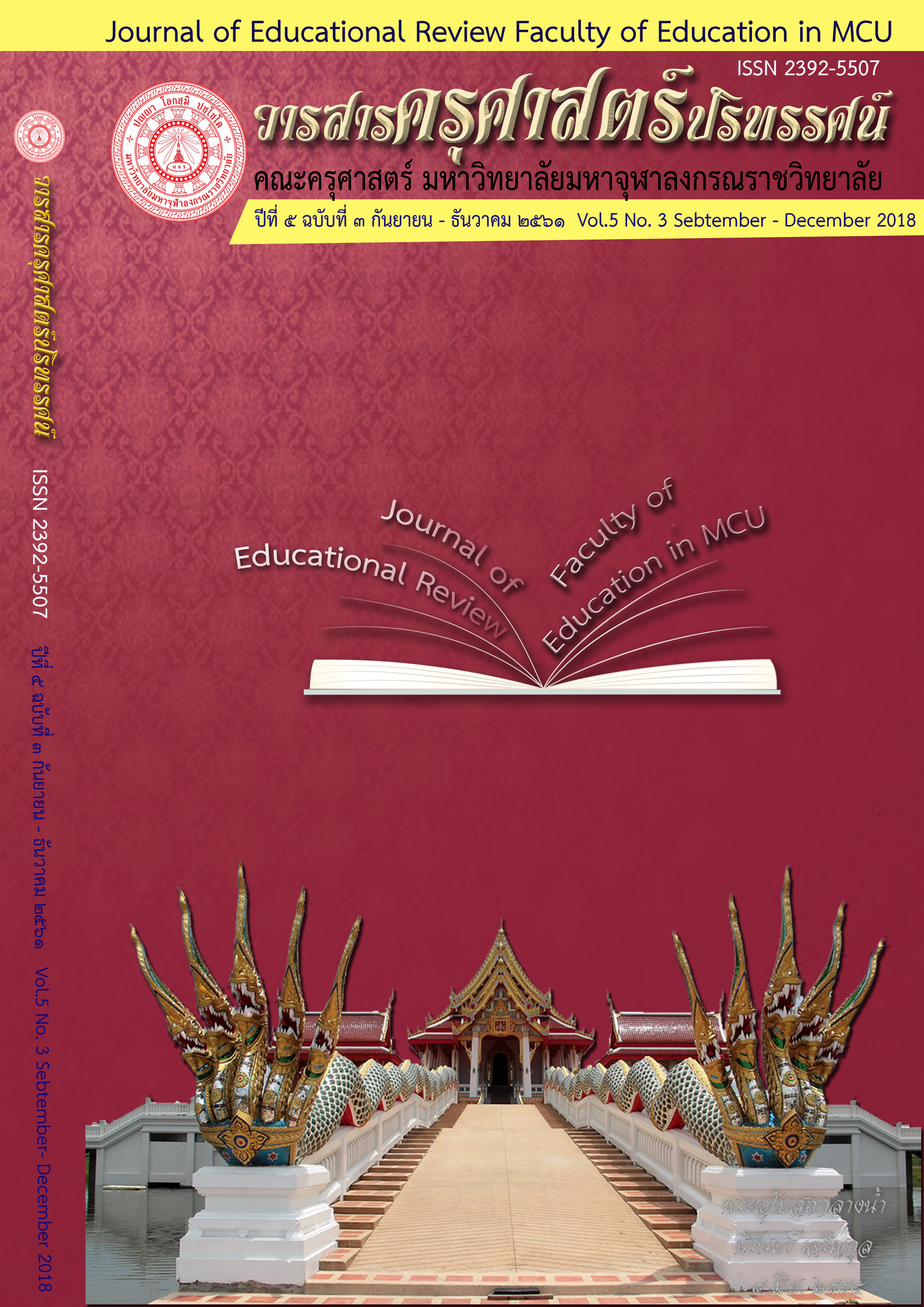Development of Life Skills Based on Sufficiency Economy Philosophy of Vocational College Students
Main Article Content
Abstract
tional college students, 2) to develop life skills of vocational college students
based on Sufficiency Economy philosophy, and 3) to propose a life skills
development process of vocational college students based on Sufficiency Economy
philosophy. The data were collected by questionnaires from 392 vocational college
students, in-depth interviews with 10 key-informants consisting of administrators,
teachers, and students’ parents of vocational colleges in Sisaket province, and focus
group discussions with 10 experts, and then analyzed by percentage, mean,
frequency, standard deviation and content analysis.
The research results found that:
1. The current situation and problems in life skills of vocational college
students were as follows; 1) In self-value and other’s value recognition, students
paid less attention to oneself than to the others, had dim target of life, and lacked of
responsibility to oneself and society. 2) In analytical thinking, making decision and
creative problem solving, students lacked of critical reflection before making decision
in situations. 3) In emotion and stress management, students lacked of
comprehension in oneself and surrounding society resulting to their stress and
emotion control. 4) In good relation building, students had little knowledge on
physical language and mental language in communicating with others.
2. The development in life skills of vocational college students based on
Sufficiency Economy philosophy was at the high level in total and in aspect. In
virtue, students should be encouraged in observing the Five Precepts and follow Hiri
and Ottappa principles together with sufficiency economy philosophy. In knowledge
condition, students should be enhanced to apply sufficiency economy philosophy in
living a life. In economy condition, students should be initiated to realize the
significance and value of living a life on sufficiency economy philosophy. In causality,
students should consider causes and effects concerning to their lives, and in
immunity, students should make daily pay record.
3. The life skills development process of vocational college students based on
Sufficiency Economy philosophy consisted of 5 aspects; 1) To recognize self-value
and the others’ value, and to be able to identify one’s own skills and capability, 2)
To have critical thinking, creative thinking, creative problem solving, and information
analysis ability, 3) To be able to manage emotion and emotional factors and stress of
oneself and the others, and 4) to create a good relationship with others through
physical and mental languages and apply to 3 circles and 2 conditions of Sufficiency
Economy philosophy; 1) In contentment; understanding, 2) In causality; daily pay
record, 3) In immunity, recycle bank, 4) In knowledge , plan for body of knowledge,
5) In virtue, to promote the practice of critical reflection and Iddhipada.
Article Details
ทัศนะและความคิดเห็นที่ปรากฏในบทความในวารสารฉบับนี้ถือเป็นความรับผิดชอบของผู้เขียนบทความนั้นเพียงผู้เดียว และไม่ถือเป็นทัศนะและความรับผิดชอบของกองบรรณาธิการ
กองบรรณาธิการขอสงวนสิทธิ์ในการคัดเลือกบทความลงตีพิมพ์และจะแจ้งให้เจ้าของบทความทราบหลังจากผู้ประเมินบทความตรวจอ่านบทความแล้ว
ต้นฉบับที่ได้รับการตีพิมพ์ในวารสารครุศาสตร์ปริทรรศน์ คณะครุศาสตร์ มหาวิทยาลัยมหาจุฬาลงกรณราชวิทยาลัย ถือเป็นกรรมสิทธิ์ของคณะครุศาสตร์ มหาวิทยาลัยมหาจุฬาลงกรณราชวิทยาลัย ห้ามนำข้อความทั้งหมดหรือบางส่วนไปพิมพ์ซ้ำ เว้นเสียแต่ว่าจะได้รับอนุญาตจากมหาวิทยาลัยฯ เป็นลายลักษณ์อักษร
References
พอเพียงโดยการวิจัยเชิงปฏิบัติการแบบมีส่วนร่วม. วิทยานิพนธ์ครุศาสตร์ดุษฎีบัณฑิต.
บัณฑิตวิทยาลัย : มหาวิทยาลัยราชภัฎพระนคร.
สหัทยา พลปัถพี. (๒๕๔๘). การนาเสนอแนวทางการพัฒนาคนให้มีคุณลักษณะตามปรัชญาของ
เศรษฐกิจพอเพียง. วิทยานิพนธ์ครุศาสตร์ดุษฎีบัณฑิต. บัณฑิตวิทยาลัย : จุฬาลงกรณ์
มหาวิทยาลัย.
สานักงานคณะกรรมการพัฒนาการเศรษฐกิจและสังคมแห่งชาติ. (๒๕๔๕). แผนพัฒนาเศรษฐกิจและ
สังคมแห่งชาติ ฉบับที่ ๙ (พ.ศ.๒๕๔๕ - ๒๕๔๙). กรุงเทพมหานคร : โรงพิมพ์คุรุสภา.


